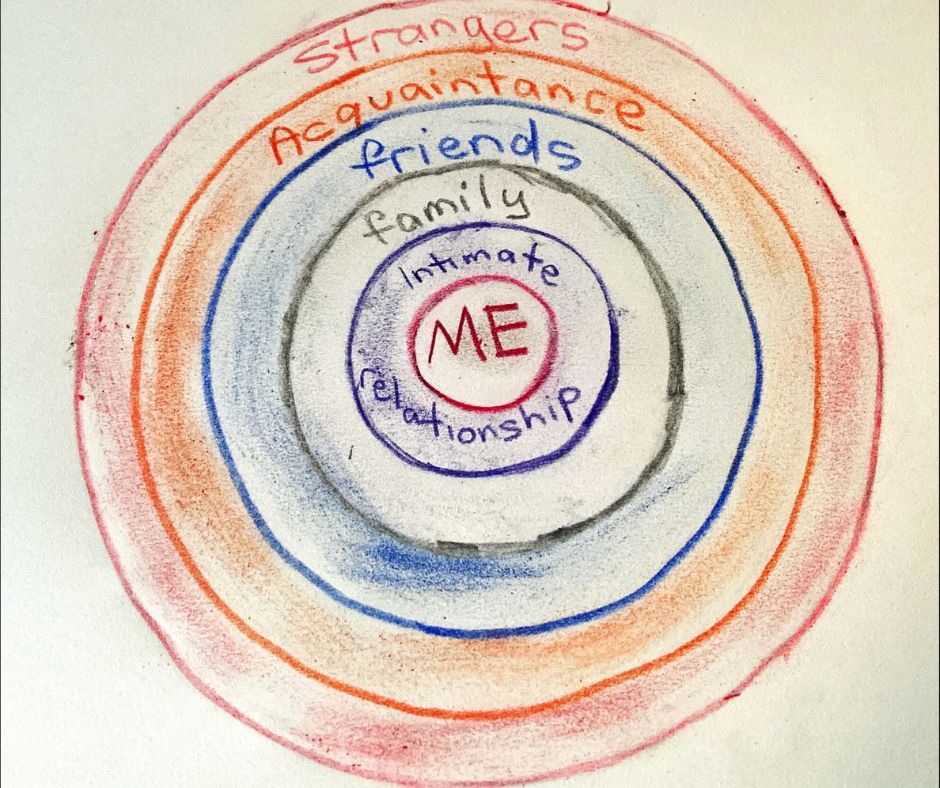
In my last blog I wrote about not suppressing your emotions and the way counselling should be an exploration of your emotions and through that to allow healing to take place.
But the fact is when you are hurting other people can inadvertently cause you pain.
I gave some examples:
• The person struggling to cope with the death of their partner being asked how they are.
• The person being asked about their job when they have just been made redundant.
• Being asked what your parents do when you are a teenager whose father has just died.For people on the receiving end of these curious or caring questions it can be something they learn to dread.
So how do you avoid causing pain to others?
Personal Boundaries
Boundaries are important to pay attention to when interacting with others.
Your boundaries and the boundaries of the other person are important.
Personal boundaries usually are best described as layers of a circle. In the centre is you. There are things you don’t ever tell other people. That is healthy and normal.
The next circle out is intimate relationships. These are the people you are intimately involved with. For a child that would be parents. For adults that is usually your romantic partner. You tell these people things you don’t tell others, but you still keep some things to yourself.
The next circle out is family. This is anyone in your family that is not your intimate relationship. This can be siblings, parents (if you are an adult), grandparents and so on. These are people you will allow to know things about you but maybe not the private thoughts you share with those you are closer to.
The next circle out is friends. These are close friends that you will share information with. People in this circle and the inner ones will be aware of more private things about you. They will be more likely to be aware of bereavements, loss of job and so on.
The next circle out is acquaintances. You will most likely say hello and exchange pleasantries with them, but they are unlikely to know private things about you.
The outside circle is strangers. Unless you are sharing information about a specific thing that you are both involved in you will not tell them anything. An example of that specific thing may be to share that you own the same breed of dog they have, or your child has the same red hair and so on.
Communicating With Others
In communication boundaries are important. The type of questions you can ask will depend on which circle you are in.
Acquaintances and strangers may become friends over time. But you need to know them better before they move into that circle.
When you are getting to know someone you are more likely to ask questions about each other. This is where things can get tricky. It is important not to ask invasive questions. Be mindful that you may be used to asking personal questions in your friendship group, but you are no longer in that group and it is not appropriate to ask some questions.
For example:
A common question women of childbearing age get is “Do you have children?”. This may seem a fairly innocuous question but it can be very upsetting.
Women struggling with fertility report the pain caused by such a question. Then there are women who don’t want children and are fed up with having to justify their choice to other people who have no right to judge their choice.
Another question to younger women who are in a steady relationship is “When are you going to have children?”. That is a big NO. That is nobody else’s business. Again, if the woman is struggling with fertility that is very hurtful.
Only raise the question of children if they raise it.
How to ask “How Are You”
Many people struggle with how to support bereaved friends. Do you ask them how they are or not? When my mother died I didn’t mind being asked. I lived on the other side of the world and no one else knew her. So it was comforting to feel someone remembered.
However, for many people, that question is one they don’t want to hear.
“How do they think I am. I just lost my [loved one].”
So what do you do?
Maybe say something else. “I have been thinking of you”. You can maybe add an offer of help. Maybe you are heading to the shops and you wonder if you can get them anything. Or you are willing to sit with them if they want to talk or just have someone there while they don’t talk.
If you want to ask how they are, preface it with “I know you are grieving and in pain at the moment. But I know that some days are better than others and I care that you are hurting and was wondering how you are today.”
What grieving people need to hear is that you haven’t forgotten their grief and that they are not alone.
What About Asking About Your Job?
Don’t.
Unless you are at a business function, when it is normal to ask someone what they do, don’t ask.
For people who are not working because they are parenting, or disabled and unable to work, or chronically unemployed that question suggests their only value is in having a job.
Asking A Child About Parents
With the high rate of relationship breakdowns at the moment, asking a child about their parents is potentially hurtful.
If the parents have separated the child may still be getting used to it and still grieving about the loss of their family unit.
If a parent is dead and they are still hurting in their grief, they won’t want to be asked that question.
This is one for adults to remember not to ask, and one to teach your children not to ask.
Asking About Family
This is similar to the one above. Remember adults can hurt too. Estrangements across a family are common and questions about family can be very difficult in the acute grief stage.
Be Mindful
When you meet a stranger or acquaintance be mindful of the topics raised in your conversation. Avoid questions that are more intimate. Stick to generalities and only ask questions on more sensitive topics if the other person raises the subject.
Be aware of the other person’s body language and monitor them for signs of discomfort. If you ask a question or make a comment and the other person looks uncomfortable, it may be appropriate to ask if your question or comment was upsetting and apologise.
Be Aware Of Which Ring You Fit Into
When interacting with other people be aware of which relationship ring you fit into.
Be wary of asking questions that are not appropriate for the relationship level.
Think before you ask questions of a friend. Is what I am going to ask going to cause pain? Is there a better way of asking? It is okay to tell a friend you don’t know what to say but you care and want to help in whatever way they need help.
If you are struggling understanding how to interact with other people, seeing a counsellor can be helpful.
Can I Help?
If you would like to talk to me about how I can help you with your communication with others, please contact me on 0409396608 or nan@plentifullifecounselling.com.au
If you would like to learn more, I write a regular newsletter with helpful information, tips, information on courses, and the occasional freebie. At the moment I have a free mindfulness meditation for anyone who signs up to my newsletter. This meditation offers a way to safely explore your feelings and learn to be okay with them. If you would like to subscribe please click on the link here: http://eepurl.com/g8Jpiz









